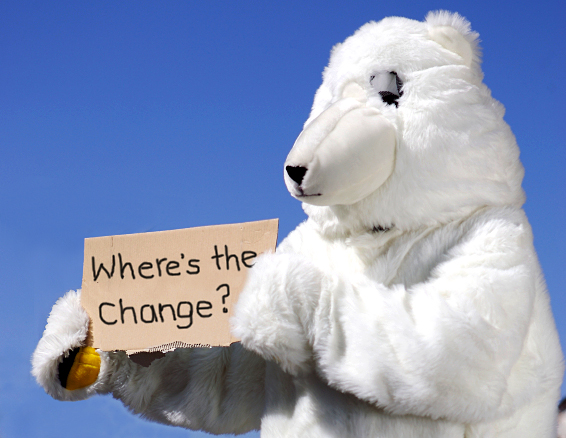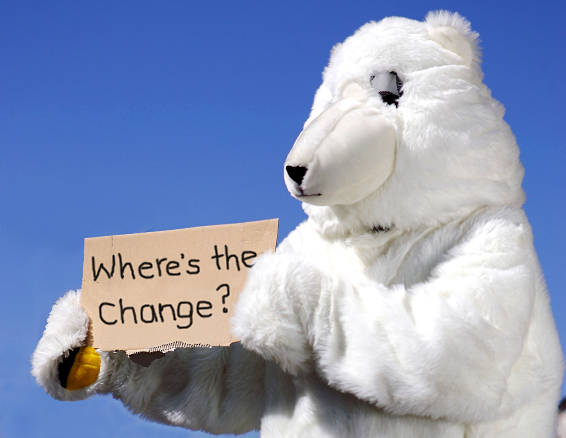 In upholding the Bush-era decision on polar bears, is Obama shrewdly pushing a larger climate agenda?iStock PhotoThe Obama administration will uphold a controversial Bush-era decision that limits protection for polar bears under the Endangered Species Act (ESA), Interior Secretary Ken Salazar announced today.
In upholding the Bush-era decision on polar bears, is Obama shrewdly pushing a larger climate agenda?iStock PhotoThe Obama administration will uphold a controversial Bush-era decision that limits protection for polar bears under the Endangered Species Act (ESA), Interior Secretary Ken Salazar announced today.
Polar bears will continue to be considered a threatened species because their arctic habitat is melting due to climate change. The decision essentially means ESA protections cannot apply to oil exploration and greenhouse gas emissions originating outside of the Arctic-—the main threats to the bears’ habitat.
For environmentalists, the decision means another disappointment from Salazar, a Coloradan with a ranching background whose environmental credentials were hotly debated when he was nominated for the post. Salazar upset wildlife defenders in March by upholding another Bush decision to take gray wolves off the endangered list in much of the northern Rocky Mountains and upper Midwest.
“For Salazar to adopt Bush’s polar bear extinction plan is confirming the worst fears of his tenure as Secretary of the Interior,” Center for Biological Diversity biodiversity program director Noah Greenwald said in an quickly released statement. “Secretary Salazar would apparently prefer to please Sarah Palin than to protect polar bears.”
“We’re very disappointed that Secretary Salazar decided not to cut through the red tape and restore protections for polar bears immediately,” Jamie Rappaport Clark, executive vice president of Defenders of Wildlife and a former director of the U.S. Fish and Wildlife Service, said in a release. “The polar bear’s Arctic sea ice habitat is melting away, the Arctic seals which polar bears hunt for food are becoming increasingly scarce, and the cause is clearly global warming. In spite of this, Secretary Salazar is leaving in place a rule that says activities that cause global warming and therefore harm polar bears will never be considered violations of the Endangered Species Act under any circumstances. That made no sense under the Bush administration and it certainly makes no sense for the Obama administration.”
In his announcement, Salazar said polar bears would continue to receive federal protection under the ESA and the Marine Mammal Protection Act; the department’s main point is that the ESA isn’t the right way to address climate change.
“We must do all we can to help the polar bear recover, recognizing that the greatest threat to the polar bear is the melting of Arctic sea ice caused by climate change,” Salazar said. “However, the Endangered Species Act is not the proper mechanism for controlling our nation’s carbon emissions. Instead, we need a comprehensive energy and climate strategy that curbs climate change and its impacts -– including the loss of sea ice. Both President Obama and I are committed to achieving that goal.”
That spin was echoed by Sen. Mark Begich, Alaska’s newly elected Democrat. “I commend Secretary Salazar for protecting the polar bear while also recognizing it is not appropriate to use a federal law like the ESA to try to regulate greenhouse gas emissions. I support Secretary Salazar’s belief that we need a comprehensive energy and climate strategy to reduce greenhouse gas emissions, but the ESA should not be used as a back-door regulatory tool to achieve this goal,” he said in a statement.
The Obama administration had until tomorrow to overturn the Bush rule, known formally as a 4(d) exemption. Today’s news could be read as further proof the president prefers to tackle climate change through a comprehensive plan — with approval from Congress — rather than through a series of regulatory maneuvers.
Don’t expect the polar bear story to end here: Defenders of Wildlife, which has sued in the past to force bear protections, said today it “will be forced to continue its litigation challenging the rule.”
It’s been an eventful few weeks in wildlife protection. Last Tuesday Obama overturned another crucial Bush ESA rule, restoring the ability of government biologists to weigh in on how federal actions would impact plants and animals. On Monday the gray wolf delisting took effect, handing the animals over to state management, which includes hunting plans, in Montana and Idaho.
And on Wednesday the Fish and Wildlife Service said it would review the threat climate change poses to the American pika, a small Western mammal that thrives only in a narrow altitude range. The pika could be the first animal in the lower 48 states to animal to join the endangered species list primarily because of climate change; FWS will submit its findings by next February.
—
Related Story: The Wolf and the Polar Bear (May 1, 2009)
Read more reactions from lawmakers and interest groups >>>
Additional reactions:
Sen. Barbara Boxer (D-Calif.), chair of Senate Environment Committee: “I disagree with the Department of Interior’s decision to limit the tools we have available under the Endangered Species Act to save the polar bear from extinction. Monitoring the situation will not tell us more than we know now – that the polar bear is threatened and we need to act.”
Sen. James Inhofe (R-Okla.), noted climate denier and ranking Republican on Senate Environment Committee: “I applaud the Secretary of Interior for making the right call and applying a common-sense approach to the Endangered Species Act. Secretary Salazar is absolutely correct: ‘The Endangered Species Act is not the proper mechanism for controlling our nation’s carbon emissions.’ The same is also true of the Clean Air Act or any other federal law.”
Alaska Gov. Sarah Palin (R): “We all want to preserve and protect the polar bear using the best possible tools, but there is absolutely no need to change the 4(d) rule to accomplish this purpose. I want to thank Secretary Salazar for his careful review of the science and the administrative record that led to this decision.”
Sen. Lisa Murkowski (R-Alaska): “I’m pleased that the department has chosen to retain the existing polar bear listing rule, which provides rational measures for the protection of polar bears within their natural range. … I appreciate the Obama administration’s position that the ESA should not be used to address global climate change, but I remain concerned about the ability of this rule to be misused through third-party lawsuits to block important projects anywhere in the country.”
Rep. Don Young (R-Alaska): “This reaches far beyond the scope of protecting polar bears. It was a political ploy influenced by the extreme environmentalists to hurt our economy, and put Americans out of jobs. Want to add more livestock to your herd? You can’t, unless you run it past Fish and Wildlife first. Want to build a school or church thousands of miles away from the nearest polar bear? Make sure you add the Department of Interior to the list of government officials you need to check with. What happened to our civil liberties? Revoking the rule would have set a dangerous precedent; it would impede our economy and hurt Americans. I commend the Secretary for maintaining the 4(d) special rule for polar bears. This is a victory for Alaska as we move toward securing our energy future.”
Rep. Doc Hastings (R-Wash.), ranking Republican on House Natural Resources Committee: “On the same day the Administration announced the highest unemployment rate since 1983, I applaud Secretary Salazar for making a common sense decision that will ensure more jobs are not lost due to excessive regulations of greenhouse gases by the government. This decision will help protect crucial projects needed to stimulate our economy from becoming the target of frivolous lawsuits by environmental groups designed to stop economic development in our country. We all want to preserve and protect the polar bear, and I am pleased the Administration has recognized that we can do that without shutting down the economies of cities and states that are thousands of miles away from the Arctic.”
Sierra Club Executive Director Carl Pope: “If polar bears are going to survive global warming, they will need far greater protections than what the law currently offers. The Bush administration enacted this special rule in an effort to delay action in the face of overwhelming evidence that global warming poses a very real and immediate threat to polar bears. It’s unfortunate that this rule is still lingering as a reminder of the Bush administration’s denial of science and failure to act.”
David Dickson, director of the Alaska Wilderness League‘s Western Arctic and Oceans Program: “We’re extremely displeased in Secretary Salazar’s decision to keep the previous administration’s polar bear policy in place. We think the title of his press release — ‘Salazar Retains Conservation Rule for Polar Bears’ — is a little bit ironic. That rule basically keeps in place protection of the polar bear under the Marine Mammal Protection Act instead of the Endangered Species Act, which the polar bear should fall under. We are hopeful that with this administration we can work with the secretary and Department of Interior to develop a rational and sound policy for the conservation of the arctic, and thus the polar bear. The polar bear is an iconic species of a habitat that is critically threatened.
Melanie Duchin, Greenpeace‘s global warming campaigner in Alaska: “Secretary Salazar’s failure to rescind this regulation only serves to cement the Bush administration’s legacy of ignoring global warming science, thus putting the polar bear at further risk of extinction. Regrettably, it seems to reflect an emerging willingness by the Obama administration to ignore clear scientific imperatives on global warming in the face of industry pressure.”



